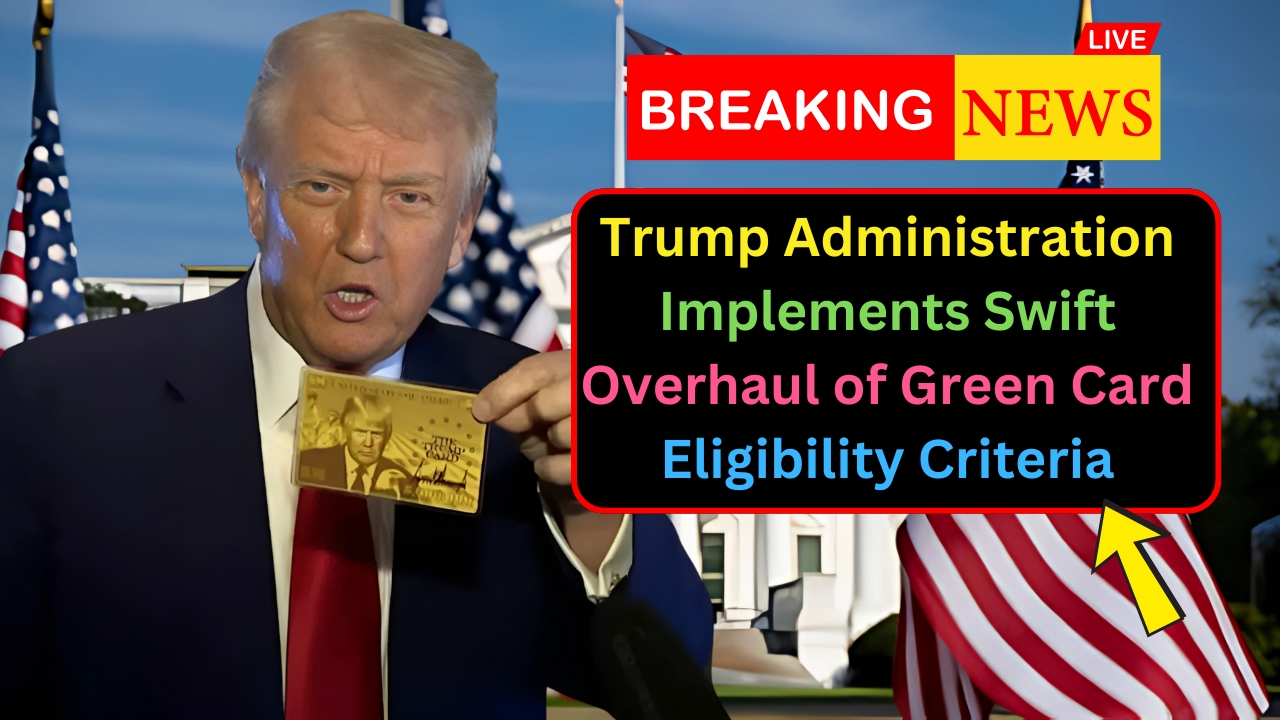The Trump administration has launched a comprehensive transformation of the United States green card system, introducing sweeping changes that significantly alter the pathway to permanent residency. These reforms, implemented rapidly across multiple immigration categories, represent the most substantial overhaul of green card eligibility criteria in recent decades.
Major Policy Changes Reshaping Green Card Applications
Enhanced Medical Examination Requirements
The Trump administration announced immediate changes to green card applications, requiring that every new permanent residency application include a renewed medical examination form. This represents a stark departure from previous policies that allowed applicants to reuse medical examination forms indefinitely.
Under USCIS’s new guidance, effective June 11, 2025, if an application is withdrawn, the I-693 is invalidated, and the applicant must retake the exam to obtain a new, signed copy. This change eliminates the previous flexibility that allowed immigrants to use existing medical forms across multiple applications.
The medical examination requirement now applies universally to all green card applicants, expanding beyond the previous limited scope. Immigration attorneys have noted that this change affects thousands of current applicants who may now need to restart their medical examination process.
Mandatory Social Media Monitoring and Enhanced Vetting
The Department of Homeland Security now uses artificial intelligence and machine learning tools to conduct more thorough background checks, including analyzing applicants’ social media activity, financial records, and biometric data. This technological approach represents a fundamental shift toward more intensive screening processes.
U.S. Citizenship and Immigration Services warned Green Card holders that their stay in the U.S. was conditional, emphasizing that permanent residency does not guarantee indefinite residence rights. The administration has made it clear that social media activity and political views can now impact immigration status.
Changes to Marriage-Based Green Card Applications
Return of Mandatory Couple Interviews
Another major update to the green card marriage process is the return of couple interviews. The Biden administration had waived many marriage-based interviews for cases without red flags, but the Trump administration has reinstated this requirement as part of enhanced vetting procedures.
Immigration lawyers report that USCIS officers have confirmed this policy change, though no formal executive order has been issued. The interviews are designed to verify the authenticity of marriages and prevent fraudulent applications.
Updated Application Forms and Disclosure Requirements
Applicants must now use the updated version of Form I-485, released on January 20, to apply for lawful permanent residency. The new form includes expanded disclosure requirements and reintroduces terminology changes that reflect the administration’s policy priorities.
The updated forms now require applicants to disclose comprehensive financial information, including household income, assets, debts, and any history of receiving public assistance. Educational background and professional certifications must also be documented in greater detail.
Impact on Different Visa Categories
H-2B and Temporary Worker Pathways
Interestingly, a Biden-era rule that took effect just three days before President Trump’s inauguration makes it easier for temporary workers to apply for permanent residency without risking their visa status. This creates a pathway that could take years for the Trump administration to modify through regulatory processes.
The horse racing industry and other seasonal employment sectors are particularly positioned to benefit from this unchanged pathway, as employers seek stability amid broader immigration enforcement.
Employment-Based Categories
Employment-based green card policies may undergo changes, with a potential emphasis on attracting highly skilled individuals in specific industries. The administration is considering implementing a points-based system that evaluates applicants based on education, work experience, and other merit-based factors.
Executive Orders and Legal Framework
Constitutional Challenges
The federal government will no longer recognize the U.S. citizenship of babies born after February 19, 2025 on U.S. soil, if the baby’s mother is unlawfully present or has temporary lawful status, and the baby’s father is not a U.S. citizen or green card holder. This controversial policy faces immediate legal challenges from multiple states and cities.
Enforcement Priorities
President Trump has signed an executive order to establish federal homeland security task forces to enable federal, state, and local law enforcement to cooperate in removing gang members, criminals, and undocumented individuals. This coordination represents a significant expansion of immigration enforcement capabilities.
Green Card Holder Rights and Protections
| Category | Previous Policy | Current Policy | Implementation Date |
|---|---|---|---|
| Medical Exams | Forms valid indefinitely | Must renew for each application | June 11, 2025 |
| Marriage Interviews | Often waived | Mandatory for all cases | February 2025 |
| Social Media Monitoring | Limited screening | AI-powered comprehensive analysis | January 2025 |
| Birthright Citizenship | All born on US soil | Conditional based on parents’ status | February 19, 2025 |
| Work Authorization | 5-year validity | Under review | TBD |
Conditional Nature of Permanent Residency
DHS officials have reiterated that green card holders are not entitled to unconditional stay, despite perceived additional protections granted to green card holders compared to other visa holders. This policy clarification has created uncertainty among the estimated 12.8 million green card holders currently residing in the United States.
Legal experts are advising green card holders to exercise caution with online activity and avoid extended international travel without proper legal consultation. The administration’s approach represents a significant shift toward viewing permanent residency as a revocable privilege rather than a protected status.
Future Implications and Timeline
Regulatory Changes Expected
The administration is taking major steps to reshape immigration policy and practice that test the limits of executive power. Immigration attorneys anticipate additional form updates requiring social media disclosure and expanded background information.
Legal Challenges
Multiple aspects of these policy changes face court challenges, particularly the birthright citizenship directive and various due process concerns. The pace of implementation has drawn criticism from legal professionals who argue insufficient notice periods violate administrative law principles.
Preparing for the New Requirements
Immigration lawyers recommend that current and prospective applicants prepare comprehensive documentation packages that exceed previous standards. Evidence of financial stability, educational achievements, and clean criminal records have become more critical than ever.
For marriage-based applications, couples should prepare extensive documentation proving relationship authenticity. Social media activity should be reviewed and cleaned up where necessary, though legal experts emphasize that Constitutional free speech protections remain in effect.
FAQs
Q: Do existing green card holders need to worry about their status?
A: Green card holders should be aware that the administration views permanent residency as conditional. Those with clean records and no legal violations generally remain protected, but social media activity and political views may face scrutiny.
Q: How long will it take to process applications under the new rules?
A: Processing times are expected to increase due to enhanced vetting procedures and mandatory interviews. Applicants should expect longer delays than previous years.
Q: Can the medical examination requirement be challenged?
A: While legal challenges are possible, the administration has broad authority over immigration medical requirements. Applicants must comply with current rules regardless of pending litigation.
Q: What happens to applications already in process?
A: Applications filed before the new requirements may need to comply with updated standards, particularly regarding medical examinations and interview requirements.
The Trump administration’s green card policy overhaul represents a fundamental shift toward stricter eligibility criteria and enhanced security screening. These changes affect every aspect of the permanent residency process, from initial applications to maintaining existing status.
While some pathways remain available, particularly for highly skilled workers and those with employer sponsorship, the overall environment has become significantly more challenging for prospective immigrants. Success in this new system will require careful preparation, comprehensive documentation, and professional legal guidance to navigate the complex requirements effectively.

